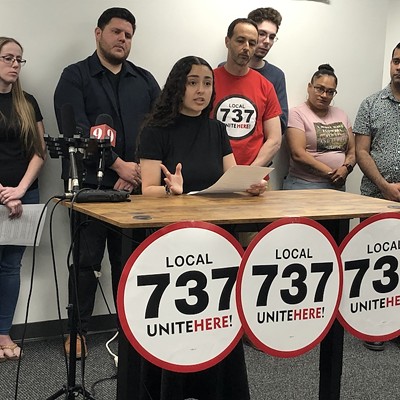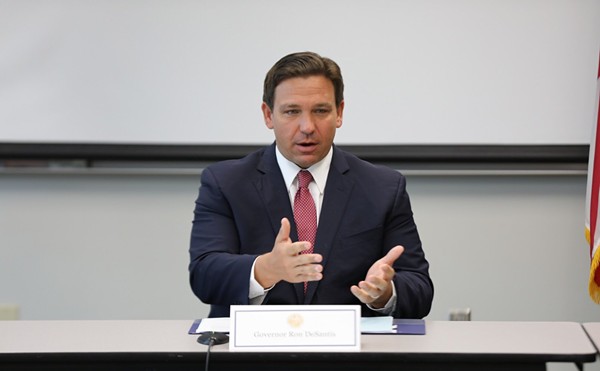By now, you've probably seen the messages from on high -- high above metro-Orlando freeways on billboards, that is.
"You think it's hot here? -- God"
As far as we can tell, the Almighty hasn't taken up self-promotion. Rather, the "God Speaks" campaign, as it has come to be known, is an advertising product of the Fort Lauderdale-based Smith Agency, which created 18 religion-based messages for highway billboards and buses.
"We wanted to make people think," says the agency's Andy Smith. "We're targeting people who no longer attend church on a regular basis."
The campaign began in Florida last fall, with $150,000 from an anonymous donor. The ads caught the attention of the Outdoor Advertising Association of America (OAAA), which convinced its membership, the big billboard companies, to take the campaign national as a public service.
According to OAAA spokesperson Sheila Hayes, the companies' response was "phenomenal." The goal was to have $15 million in donated space and 10,000 billboards nationwide during the first year, and in less time than that, they've already surpassed the target number of billboards.
"It's the perfect use of outdoor advertising," says Hayes. "Get attention with just a few words. Make an impact."
Most of the messages are warm-hearted or encouraging: "Tell the kids I love them -- God" and "Need a marriage counselor? I'm available -- God."
But others can be pretty testy: "Keep using my name in vain and I'll make rush hour even longer. -- God."
"It's our job to create messages that encourage the use of a product, that motivate people to try a service," says Smith. "We think this campaign is the way God would speak to people in a '90s way. We hope people who have drifted away from the church will say, 'This is cool.'"
But will they come back into the fold? Getting butts back in pews was the goal of a 1981 campaign that's credited with being the first church advertising to use hip, modern vernacular. The client was George Martin, at the time rector of St. Luke's, now vicar of Sts. Martha and Mary, both Episcopal churches in Minneapolis.
Martin hired one of the hottest young creative shops in America, Fallon-McElligott-Rice, to develop a campaign for his church. The resulting series of ads, which employed the prevailing creative style of the time -- the juxtaposing of a single, strong image with an ironic headline -- won several creative awards.
Martin parlayed those ads into a business, the Church Ad Project, which creates ads and marketing material, available through a catalog to churches of all denominations.
"Evangelism is believing in your product and putting it out there," says Martin. "It's all about communicating. It has to be compelling, creative, persuasive."
Ad agencies see church advertising, usually done for free, as an opportunity to show off their creativity -- or irreverence. "Free Admission. Plenty of seating. Two hours shorter than Titanic," says the headline of an ad created for the Wheatland Presbyterian Church, by Stoner Bunting Advertising, both of Lancaster, Pa.
Steve Smith, media pastor of the First Baptist Church of Orlando, says that the billboards' "branding" of God is fine as long as the concepts are scripturally based. Indeed, First Baptist recently organized a marketing strategy group to study effective uses of advertising, public relations and the Internet. "We believe very strongly in the value of marketing the church and marketing the faith. We don't believe there's anything wrong with doing that," he says. "As the media broadens its content, and as more negative content flows into the mainstream media, then we need to counter that with positive content."
But some non-Christian spiritual leaders are more hesitant. The Venerable Samu Sunim, a Zen priest and head of the Buddhist Society for Compassionate Wisdom, thinks it's good to encourage people to "love thy neighbor." But he's concerned that they might invoke a lack of tolerance for religions that might not share a belief in a Christian-style God.
David Neff is one Christian who is concerned about making God into a product. Neff, executive editor of Christianity Today magazine, likes the God Speaks campaign but warns against the "commodification" of religion, in which religion is made into a commodity, like a Lexus or a Quarter Pounder with cheese. He points out the double bind Christians are in, condemning the consumer culture but then using the culture's most powerful tool, advertising, on their own behalf.
"Advertising's aim is to bypass our rational faculties," says Neff. "Short, powerful messages like billboards totally bypass the thinking process and simply create an image for a product."
The danger is that people will go to a church not because of their belief but because they have an image of what the church can do for them -- "consumer religion," in Neff's words.
Martin doesn't see the problem. "The mark of great advertising is that people talk about it. Advertising with an edge of brilliance and honesty moves through all the clutter and finds a place in the memory."
Which is, he adds, something like Jesus' ministry itself.


















